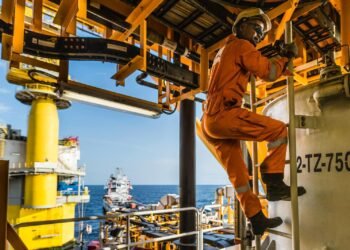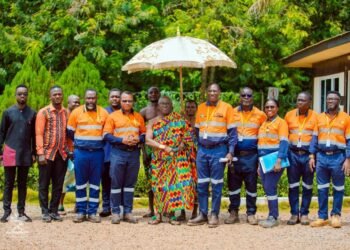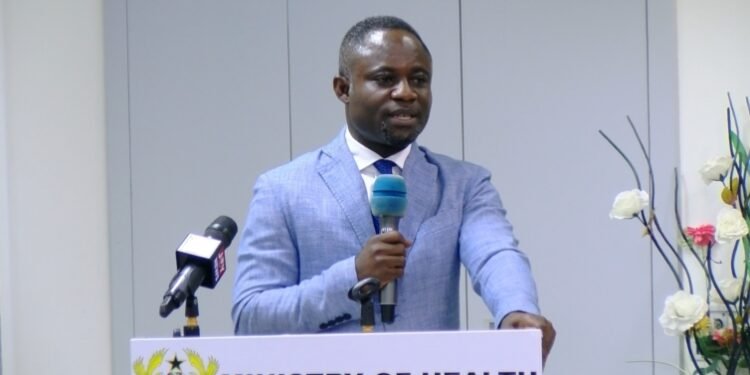West Africa’s biggest refinery, Dangote oil refinery, is nearing completion with Q3 2022 projected to assume the commencement of the processing of crude. However, Ghana’s petroleum hub development appears to lag in pace, only having constituted a board since August 2021.
On January 24, 2022, Aliko Dangote, Nigerian business magnate, said in a briefing at the plant’s site in Lagos that mechanical work on the refinery was completed and “hopefully before the end of third quarter we should be in the market.”
The refinery is expected to start with a processing capacity of 540,000 barrels per day, Dangote said. “Full production can start maybe, by the end of the year or beginning of 2023,” he added.
The facility, which will cost an estimated $19 billion to build, has an installed capacity of 650,000 barrels per day. This has been touted as the surest way to meet Nigeria’s fuel demands and to ultimately turn the country into a net exporter of refined crude while maintaining its dominance in crude production.
Ghana’s refining capacity has the prospect of increasing by 600,000b/d, with the project expected to come online by 2030, and only 8 years to go. Currently, major oil exporters in the region such as Nigeria are facing declining oil revenues and oil production are subsequently waning, as a result of the global campaign of climate change.
That said, this stands as a big threat to Ghana’s petroleum hub agenda coupled with the impact of the ongoing energy transition, in terms of soliciting investments into fossil fuels. Now, it is uncertain whether this project would hit the ground and running by 2030.
Investors Mulling Capital Risks and Energy Transition Concerns Amid AfCFTA Context
Raising capital to invest in the project proves to be a herculean task, and now that Dangote’s refinery is coming online in the next few months, potential investors may be mulling over concerns of capital risks.
Should investors favour negotiations highlighting that funding of the petroleum hub would turn initial ownership and operation to them for a specified time before ownership reverts to Ghana also has several implications, especially, considering how that will play out in the context of the African Continental Free Trade Area (AfCFTA).
It is worthy to note that, this model of financing has been used in several occasions, especially in upstream operations and it would not be surprising if the government goes this direction, looking at the fact that the deadline for starting the project is fast-approaching.
Precisely so, the regulator agrees with this, as Kwaku Boateng, Director for Local Content, Petroleum Commission is cited to have said during the sidelines of the Africa Energy Week (AEW) in Capetown that:
“We see it as a big threat to the petroleum hub development because the original idea was that we are going to make Ghana a hub for petroleum products where we are going to have a logistic piece for supplying petroleum products to the West Africa and Sahelian region.
“Now, with the massive development by Dangote in Lagos, we think that it is going to pose as a serious competitor in the petroleum hub development. But… we are going beyond the petroleum refinery. The focus is to develop a petrochemical industry including fertilizer, urea, ethanol and other petrochemical products using potential gas resources. We have gas resources that are still stranded and we want to use the petroleum hub as a medium for doing that.”
Kwaku Boateng, local content, Petroleum Commission
Questions that arise include: to what extent the government has incorporated calculable risks to the running of this project, when it is completed and how it would maneouvre through such challenges to ensure profitability? Therefore, stating that the petroleum hub project has other facets of operations it would run along with, apart from the refinery is too simple and may be ‘elusive’ to say the least.
Fitch, bearish over Petroleum Hub Project
More so, whether importers of petroleum products in the SSA region will be ready to accept exports of the country’s refined petroleum products once the petroleum hub project comes online remains uncertain. As some countries in the region are going ahead to look for alternatives in clean energy sources such as renewable energies, for instance, Namibia and Rwanda to mention a few.
Thus, Ghana’s petroleum hub, coming online anytime later than the proposed deadline may face a lot of challenges.
Fitch, in its outlook for 2022, posted a bearish stance on the project’s feasibility, although optimistically, it provides significant upside risk growth to the country’s downstream sector.
“Ghana is expected to register positive growth of 3.0% in its refined fuels consumption over 2022, to reach 96,800b/d, owing to upbeat GDP growth prospects and a recovery in private consumption. The Petroleum Hub Development project offers significant upside to the country’s downstream sector, however, we remain bearish about the project’s feasibility”.
Fitch Solutions Report
These risk exposures should be factored into decision making to ensure that the project is not rushed, only to face insurmountable challenges and eventually compounding the country’s energy sector debt woes.
READ ALSO: There’s no Food Crisis in Ghana– Prof. Egyir






















